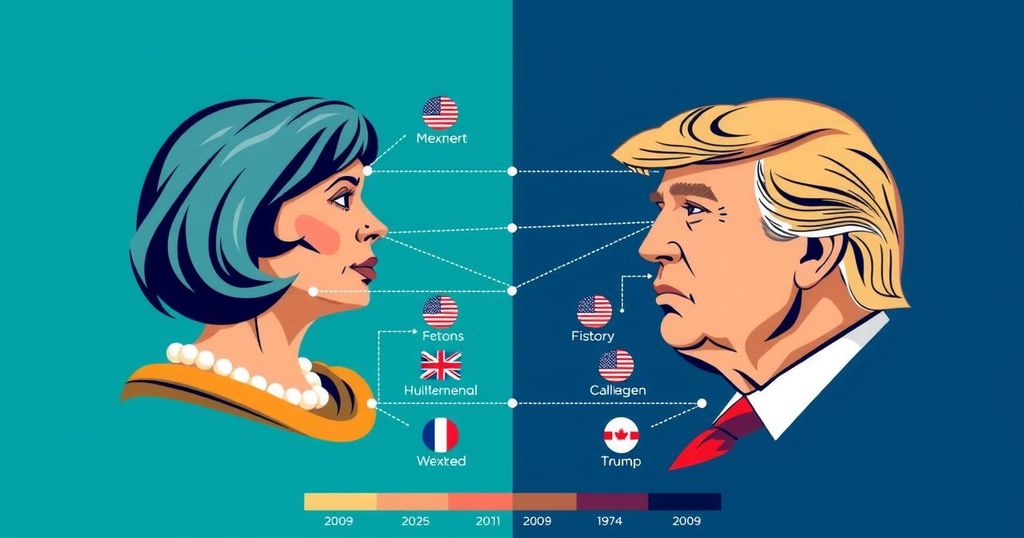US Election: Global Perspectives on Presidential Candidates Harris and Trump

As the U.S. elections draw near, global leaders are keenly observing the closely contested race between Vice President Kamala Harris and former President Donald Trump. Leaders such as Vladimir Putin lean towards Trump, while Xi Jinping and European allies like Chancellor Olaf Scholz show signs of favoring Harris. The outcomes of these elections will significantly impact international relations, defense policies, and trade partnerships worldwide.
As the United States prepares for its upcoming presidential election on November 5, the contest between Democratic Vice President Kamala Harris and Republican former President Donald Trump has ignited significant interest globally. With both candidates reportedly in a dead heat per recent polls, leaders from around the world are closely observing the election due to the considerable impact of U.S. policy decisions on international relations. In Russia, President Vladimir Putin has historically shown an inclination towards Trump, viewing him as an individual who may be amenable to negotiations regarding Ukraine and sanctions. Analysts suggest that Putin perceives Trump as a reflection of his own authoritarian approach, indicating a preference for his return to the presidency. While publicly alluding to Harris’s likable qualities, Putin’s past behavior suggests a strategic affinity for Trump, particularly given Trump’s previous encouragement of discord within Western alliances. Chinese President Xi Jinping remains reticent in publicly supporting either candidate, yet insights from experts suggest a subtle preference for Harris, given the tensions that have characterized U.S.-China relations under Trump. Trump’s trade policies, specifically, the imposition of tariffs, signify a contentious period; however, both candidates have adopted harsh rhetorical positions on China. Israeli Prime Minister Benjamin Netanyahu appears to lean towards Trump, having cultivated a relationship defined by mutual support during Trump’s prior presidency. However, the political landscape has shifted since the Biden administration took office. Despite Biden’s ongoing support for Israel, both U.S. and Israeli relations are fraught with challenges rooted in domestic and international politics. Within Europe and NATO, leaders predominantly favor Harris, particularly given Trump’s past threats to withdraw from NATO and his contentious remarks regarding European allies. German Chancellor Olaf Scholz specifically endorsed Harris’s leadership potential, suggesting that she aligns more closely with the European Union’s values. Indian Prime Minister Narendra Modi appears to maintain a neutral stance regarding either candidate. His diplomatic approach reflects a broader U.S. consensus on engaging with India as a strategic partner, irrespective of which candidate emerges victorious. In the Asia-Pacific region, South Korea and Japan demonstrate caution regarding Trump, who historically has taken a combative approach with allies while asserting stronger demands for military expenditure. Conversely, Harris is projected to maintain Biden’s policies, which have reinforced collaborative efforts in the region. Moreover, concerns in Australia regarding a Trump victory revolve around potential impacts on climate policy and U.S.-China trade relations, both of which are pivotal to Australian economic considerations. Ultimately, the upcoming presidential election is not only pivotal for American citizens but also holds significant implications for global political dynamics as world leaders indicate their preferences amidst uncertainty surrounding both candidates’ foreign policies.
The U.S. presidential election is a critical event not only for American citizens but also for various world leaders who are keenly aware of the implications it holds for international relations. As the election date approaches, the candidates’ positions on significant global issues—including trade, defense, climate change, and diplomatic relations—interest foreign governments who may have varying degrees of preference for either candidate based on their past actions and likely future policies. This complex interplay highlights the importance of U.S. domestic politics in shaping global dynamics.
In conclusion, the perspectives of world leaders on the upcoming U.S. presidential election illuminates the complexities and global implications associated with the potential victory of Kamala Harris or Donald Trump. As leaders express varying degrees of support, their preferences are often influenced by the candidates’ historical actions and anticipated policies. Navigating these international relationships will prove vital for the United States, particularly as it confronts a multitude of challenges both at home and abroad.
Original Source: www.aljazeera.com







